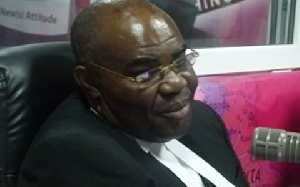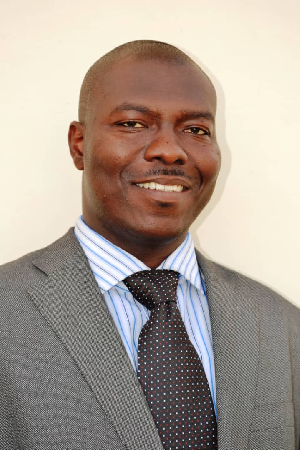- Home - News
- TWI News | TV
- Polls
- Year In Review
- News Archive
- Crime & Punishment
- Politics
- Regional
- Editorial
- Health
- Ghanaians Abroad
- Tabloid
- Africa
- Religion
- Election 2020
- Coronavirus
- News Videos | TV
- Photo Archives
- News Headlines
- Press Release
General News of Friday, 13 November 2015
Source: classfmonline.com
Ex-AG: Amendments not sole preserve of Parliament
Former Attorney General, Nii Ayikoi Otoo, has disagreed with US-based Ghanaian law Professor, Kweku Asare, that only Parliament has the right to initiate a review process to amend entrenched provisions in the 1992 Constitution.
A seven-member panel of the Supreme Court chaired by Chief Justice Georgina Wood, in October this year, dismissed, by a 5-2 majority decision, an application by Prof Asare, which sought to stop a review process of the Constitution, started by President John Mills (late).
Despite the ruling by the apex Court, Prof Asare insists Parliament’s role in the entire process, per Article 290 of the 1992 Constitution, has been effectively “obliterated.”
Article 290 states that: “A bill for the amendment of an entrenched provision shall, before Parliament proceeds to consider it, be referred by the Speaker to the Council of State for its advice and the Council of State shall render advice on the bill within thirty days after receiving it. After the bill has been read the first time in Parliament it shall not be proceeded with further unless it has been submitted to a referendum held throughout Ghana and at least forty percent of the persons entitled to vote, voted at the referendum and at least seventy-five percent of the persons who voted cast their votes in favour of the passing of the bill. Where the bill is approved at the referendum, Parliament shall pass it.”
However, in a discussion on ‘Point of Law,’ a legal platform on Class 91.3FM hosted by Godwin Agyei-Gyamfi, Mr Ayikoi Otoo argued that: “The Constitution does not give power only to Parliament because if the drafters wanted to do that, they would have said that Parliament, may by an Act of Parliament, amend any provision of this Constitution and then where it involves an entrenched one, the procedures, which you may be looking for, could also have been provided for.”
“I do not think you can say exclusively that the power only lies with Parliament,” he argued.
After the initial work of the Constitution Review Commission (CRC) – collation of views from Ghanaians across the country about which aspects of the 1992 Constitution needed a review – a Constitution Review Implementation Committee (CRIC) chaired by Prof. Emmanuel Victor Dankwah, was set up by the Government to make recommendations for the review process through a referendum.
Apart from the CRC, Prof Asare also had qualms with CRIC, and said at the time that: “Professor Dankwah and his so-called Constitution Review Implementation Committee have no power under the laws of Ghana to schedule a referendum and/or to amend the Constitution of Ghana.”
He argued that: “Parliament is the sole body that can initiate, consider and propose amendments to the Constitution.”
Below is the statement released by Prof Asare at the time:
My attention has been drawn to an article posted on your website on July 16, 2014, titled “Do you want the Death Penalty abolished?” In the said article, Professor Emmanuel Victor Dankwah, Chairman of the so-called Constitution Review Implementation Committee, is reported to have addressed a forum in Kumasi where he explained that Ghanaians will answer questions on the death penalty during an upcoming referendum.
I wish to bring it to the attention of the general public that Professor Dankwah and his so-called Constitution Review Implementation Committee have no power under the laws of Ghana to schedule a referendum and/or to amend the Constitution of Ghana.
It is common knowledge that the Constitution can only be amended by its terms. It is also well known that Parliament is the sole body that can initiate, consider and propose amendments to the Constitution.
Parliament’s power to amend the Constitution is not only plenary and exclusive but also cannot be delegated to or usurped by the President, the so-called Constitution Reform Commission or the Constitution Review Implementation Committee. Further, it is trite knowledge that the President’s role in constitutional amendment is limited to the ministerial task of giving assent to bills properly passed by Parliament.
We maintain, as we have from 2010, that the President has no power to set up a commission to initiate amendments or draft amendment bills to the Constitution. To the extent that the President has usurped Parliamentary powers and misappropriated Article 278(1) to traverse the amendment architecture emplaced by Chapter 25 of the Constitution, C.I. 64 setting up the Constitution Review Commission, all actions taken by the Commission, the establishment of the Constitution Review and Implementation Committee and all its actions remain unlawful, unconstitutional, impermissible, null, void and of no effect.
As Professor Dankwah and his Committee should be aware, the Supreme Court of Ghana has been asked to issue an order directing the President, the Chairman and Members of the Constitution Review Commission, the Chairman and Members of the Constitution Review Implementation Committee, the Attorney General, their deputies, agents, or employees or any other servant or agent of the Republic to permanently cease and desist from taking any actions that seek to amend or otherwise disturb the Constitution in so far as such actions are inconsistent with Chapter 25 of the Constitution (writ # J1/12/2014).
Moreover, during the pendency of the litigation before the Supreme Court of Ghana, the President, the Chairman and Members of the Constitution Review Commission, the Chairman and Members of the Constitution Review Implementation Committee, the Attorney General, their deputies, agents, or employees or any other servant or agent of the Republic are required to cease and desist from taking any actions that seek to amend or otherwise disturb the Constitution, in so far as such actions are inconsistent with Chapter 25 of the Constitution.
Since 1992, Ghana has chosen the path of law and order in the management of its affairs. It is therefore regrettable that Professor Dankwah and his Committee have chosen the path of taking actions that are contemptuous of the Supreme Court.
We plan to litigate this matter to its logical conclusion and call on the Chairman of the so-called Constitution Review Implementation Committee to terminate with immediate effect all activities related to altering and amending the Constitution.
S. Kwaku Asare
July 16, 2014











